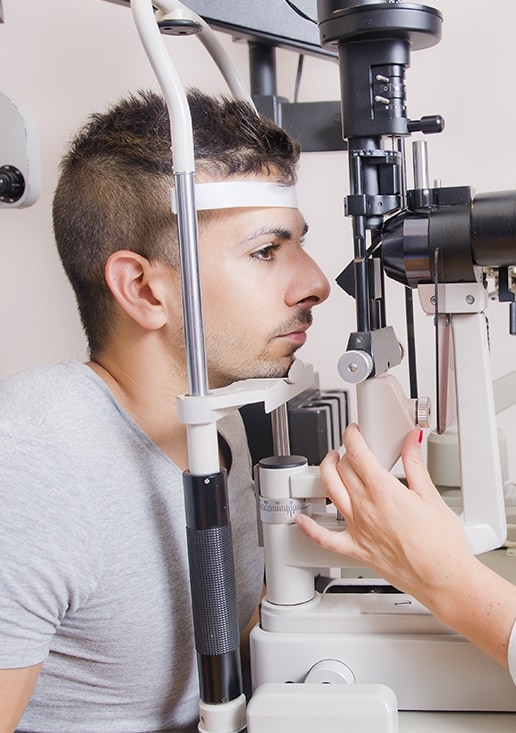
Your Safety Comes First
Eye emergencies can happen at any moment, and they can be scary to deal with. We understand this and provide emergency eye care services for eye infections, eye injuries, and other serious issues.
Getting urgent care for eye injuries as soon as possible is crucial to prevent potential vision loss and complications. If you experience an eye emergency, please don’t hesitate to contact us for urgent care. If your emergency happens after hours, go to your nearest emergency room.
When to Seek Emergency Care
Eye emergencies are serious and can range from surface injuries, chemical injuries, and infections to other conditions such as random flashes and floaters.
Common signs and symptoms of an eye emergency can include:
- Bleeding from the eye
- Eye pain in one or both eyes
- Bruising around the eye
- Double vision
- Eye bulging
- Physical trauma
- Partial or complete loss of vision
If you experience an eye injury, getting medical attention as soon as possible is essential, as symptoms can vary. We strive to help alleviate the stress and anxiety of an eye emergency and help preserve your vision.


Exploring Different Eye Emergencies
An eye emergency can occur without notice and appear with different symptoms. Let’s look at some common and not-so-common types of eye emergencies and how to handle them in the moment to prevent further damage.
Chemical Eye Injuries
Chemical eye injuries can occur around the house while cleaning up or even at work. Chemicals from cleaning or gardening products, and industrial chemicals can accidentally get in your eyes from spills or sprays.
If you get chemicals in your eyes, the following steps can help:
- Wash your hands with soap and cool water thoroughly.
- Turn your head so the affected eye is down and to the side.
- Hold the affected eyelid open and flush it out with clean tap water for 15 minutes.
A chemical spill or spray in your eyes can cause severe damage, and you should seek emergency care as soon as possible.
Flashes & Floaters
Flashes appear as bright, flickers of lights in your field of vision, and they can appear on and off over weeks or even months. While occasional flashes can become more regular as you age, random new flashes can signal something worse, like a retinal detachment.
Floaters appear as tiny squiggly lines or cobwebs in your field of vision. While they look to be in your central vision, they are made of tiny clumps of gel or cells floating around inside your eyes, casting a shadow in your vision.
You should contact us right away if:
- You have an increased amount of random flashes
- You notice many new floaters
- A gray curtain covers part of your vision
- A shadow appears in your peripheral vision
These symptoms can signify more severe vision issues, so scheduling a check-up is recommended to be safe.
Small & Large Foreign Objects
Small foreign objects like sand or dust can get in your eyes throughout the day and cause discomfort. Most of the time they’ll be harmless, but here are some steps you can take to clear your eyes of debris:
- Avoid rubbing your eye and try blinking to clear out the object
- Wash your hands and examine your eye to try to locate the object
- Use artificial tear eye drops to rinse out the object
- Flush the object out with cool water if something is stuck on or under your eyelid
- Contact us for emergency eye care if the object cannot be removed and irritation continues
Large foreign objects like glass or metal can cause severe damage if they get stuck in your eyes.
If a large foreign object is stuck in your eyes, it’s essential not to touch the object. Do not apply pressure or attempt to remove it. Leave it as is and seek immediate emergency medical attention.
Scratches & Punctures
Your eyes are sensitive to trauma, and a cut or scratch to your eyeballs or eyelids can result in the need for emergency care. Applying a loose bandage to the affected area while you wait for medical attention can help protect the area from further damage.
It’s important not to apply pressure to the injured area.
Conjunctivitis
Conjunctivitis, also known as pink eye, occurs when there is an inflammation or infection of the transparent membrane that lines the eyelid and covers the front of your eyes.
While conjunctivitis may not always qualify as an eye emergency, in some cases, it can be contagious and cause eye pain and severe redness. If you have a severe case of conjunctivitis, visit us for urgent care.
Common signs and symptoms of conjunctivitis can include:
- Tearing in the affected eye
- Itchy eyes
- A pus-like discharge
- Eye redness

In Your Corner For Emergency Eye Care
We aim to be there for you if you experience an eye emergency to provide treatment.
If you need emergency eye care, please don’t hesitate to contact us for emergency treatment. If your eye emergency occurs after hours, proceed to your nearest emergency room.

Our Brands
Brands We Carry






Our Google Reviews
Our Locations

Heights Optometry
- Phone: 619-431-5393
- Email: [email protected]
- 3404 Adams Ave
- San Diego, CA 92116
Hours
- Monday: 9:00 AM – 5:00 PM
- Tuesday: 9:00 AM – 5:00 PM
- Wednesday: Closed
- Thursday: 9:00 AM – 5:00 PM
- Friday: 9:00 AM – 5:00 PM
- Saturday: 9:00 AM – 2:00 PM
- Sunday: Closed
North Park Optometry
- Phone: 619-298-5524
- Email: [email protected]
- 3068 University Ave
- San Diego, CA 92104
Hours
- Monday: Closed
- Tuesday: 9:00 AM – 5:00 PM
- Wednesday: 9:00 AM – 5:00 PM
- Thursday: 9:00 AM – 5:00 PM
- Friday: 9:00 AM – 5:00 PM
- Saturday: 9:00 AM – 2:00 PM
- Sunday: Closed
La Mesa Optometry
- Phone: 619-550-0403
- Email: [email protected]
- 8321 La Mesa Blvd
- La Mesa, CA 91942
Hours
- Monday: CLOSED
- Tuesday: 9:00 AM – 5:00 PM
- Wednesday: 9:00 AM – 5:00 PM
- Thursday: 9:00 AM – 5:00 PM
- Friday: 9:00 AM – 5:00 PM
- Saturday: 9:00 AM – 2:00 PM
- Sunday: Closed














